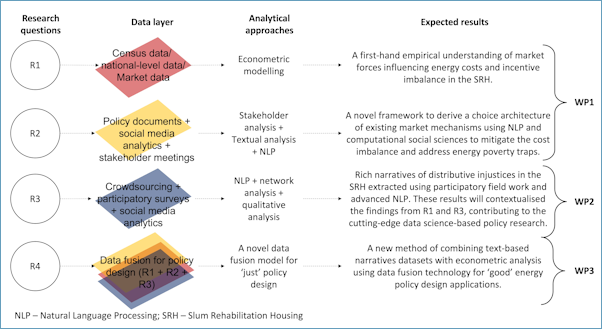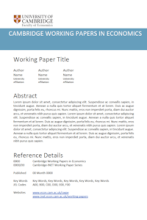Slum rehabilitation housing developments (SRHs) are transitional urban spaces designed to alleviate poverty and tackle the problem of urban slums.
These affordable housing developments designed for the low-income population are an expanding form of building stock in rapidly urbanising cities experiencing high-density rural-urban migration, such as Mumbai, Rio de Janeiro, Nairobi, Lahore, Jakarta and Addis Ababa. A persistent problem in the SRH is energy poverty. For example, a recent study has shown that SRH occupants in Mumbai pay up to 40% of their monthly income towards electricity. This project concerns energy justice and its distributive outcomes for those on low incomes.
The policy implications of the intersection of energy, health and housing inequality have not been explored so this project aims to address this significant research gap with regard to distributive energy justice. The rise of energy poverty traps in the SRH represents an institutional inefficiency in these ‘affordable for all’ programs requiring interdisciplinary investigation. This research will investigate what causes electricity affordability challenges for people living in the SRH with reference to the economic incentives facing the housing developers. The methodology will include primary data collection on energy expenditure by households in the Mumbai SRH and its analysis using data fusion approaches combining econometric modelling with state-of-the-art data science techniques. It will enable a better understanding of the SRH model and how incentive systems, and mechanisms can be designed to prevent energy poverty traps emerging in future low-income housing developments.
Harnessing human and machine intelligence for planetary-level climate action, Nature (Nature Portfolio Journal on Climate Action), 17 August 2023
Is data justice key to climate justice?, University of Cambridge Research News, 17 August 2023
Climate change is fueling deadly heat waves in India. It’s putting the country’s development at risk, study says, CNN, 20 April 2023
India's heatwaves putting economy, development goals at risk, Reuters, 20 April 2023
Killer heatwaves endanger India's development, University of Cambridge Research News, 19 April 2023
India's heat is underestimated, harming progress, study says, The Washington Post, 19 April 2023
India’s heat waves endanger development of most populous nation, Bloomberg UK, 19 April 2023
India suffers from unusually early severe heatwave, BBC World Business Report, 21 April 2023
COP must reverse rising pessimism over building sector decarbonisation, University of Cambridge Research News, 17 November 2022
Social media enables people-centric climate action in the hard-to-decarbonise building sector
Social Media Enables People-Centric Climate Action in the Hard-to-Decarbonise Building Sector, Ramit Debnath, Ronita Bardhan, Darshil U. Shah, Kamiar Mohaddes, Michael H. Ramage, R. Michael Alvarez and Benjamin K. Sovacool, Scientific Reports, Vol. 12 no. 19017 (2022)
The building and construction sector accounts for around 39% of global carbon dioxide emissions and remains a hard-to-abate sector. We use a data-driven analysis of global high-level climate action on emissions reduction in the building sector using 256,717 English-language tweets across a 13-year time frame (2009–2021). Using natural language processing and network analysis, we show that public sentiments and emotions on social media are reactive to these climate policy actions. Between 2009–2012, discussions around green building-led emission reduction efforts were highly influential in shaping the online public perceptions of climate action. From 2013 to 2016, communication around low-carbon construction and energy efficiency significantly influenced the online narrative. More significant interactions on net-zero transition, climate tech, circular economy, mass timber housing and climate justice in 2017–2021 shaped the online climate action discourse. We find positive sentiments are more prominent and recurrent and comprise a larger share of the social media conversation. However, we also see a rise in negative sentiment by 30–40% following popular policy events like the IPCC report launches, the Paris Agreement and the EU Green Deal. With greater online engagement and information diffusion, social and environmental justice topics emerge in the online discourse. Continuing such shifts in online climate discourse is pivotal to a more just and people-centric transition in such hard-to-decarbonise sectors.
Bridging the Divide in Energy Policy Research: Empirical Evidence from Global Collaborative Networks
Bridging the Divide in Energy Policy Research: Empirical Evidence from Global Collaborative Networks, Muez Ali, Lilia Caiado Couto, Samuel Unsworth and Ramit Debnath, Energy Policy, Vol. 173 (2023)
Energy research seeking to influence policy in low- and middle-income countries (LMICs) is often funded by – and conceptualised by authors in – institutions from higher income countries (HICs). Research agendas and policy recommendations determined in HICs potentially yield the most influence on policymaking in LMICs. This risks leaving a multidimensional gap in how LMICs frame, evidence and enact policies. This paper is the first to provide quantitative evidence to geographical imbalances in energy policy research, and to shed light into the fact that research proposing energy policy coupled with development objectives to LMICs is dominated by HICs researchers. We find that the latter not only publish more articles proposing energy policy to LMICs, but also are more cited when doing so. We reach these findings by analysing the spatial dynamics of energy research on LMICs through a multi-method approach using bibliometric, network science and regression-based techniques. We established a framework using a sample of 6,636 papers from the Web of Science database, journal impact data from Scimago Journal Ranking and country economic data from the World Bank. Results show the existence of a cycle of imbalances across research practices. Most scientific articles recommending energy policy for LMICs have a primary author based in a HIC, funded by a HIC institution. The number of citations articles receive increases with the GDP of the country of primary author. Funders support authors based in countries of the same income band or higher. We recommend revising research practices and funding policies to place local actors and knowledge at the heart of energy policy research, enabling high-impact policymaking in LMICs.
Do Fossil Fuel Firms Reframe Online Climate and Sustainability Communication? A Data-Driven Analysis
Do Fossil Fuel Firms Reframe Online Climate and Sustainability Communication? A Data-Driven Analysis, Girish Bahal, Ramit Debnath, Danny Ebanks, Kamiar Mohaddes, Thomas Roulet, R. Michael Alvarez, npj Climate Action, Vol. 2 no. 47 (2023)
Identifying drivers of climate misinformation on social media is crucial to climate action. Misinformation comes in various forms; however, subtler strategies, such as emphasizing favorable interpretations of events or data or reframing conversations to fit preferred narratives, have received little attention. This data-driven paper examines online climate and sustainability communication behavior over 7 years (2014–2021) across three influential stakeholder groups consisting of eight fossil fuel firms (industry), 14 non-governmental organizations (NGOs), and eight inter-governmental organizations (IGOs). We examine historical Twitter interaction data (n = 668,826) using machine learning-driven joint-sentiment topic modeling and vector autoregression to measure online interactions and influences amongst these groups. We report three key findings. First, we find that the stakeholders in our sample are responsive to one another online, especially over topics in their respective areas of domain expertise. Second, the industry is more likely to respond to IGOs’ and NGOs’ online messaging changes, especially regarding environmental justice and climate action topics. The fossil fuel industry is more likely to discuss public relations, advertising, and corporate sustainability topics. Third, we find that climate change-driven extreme weather events and stock market performance do not significantly affect the patterns of communication among these firms and organizations. In conclusion, we provide a data-driven foundation for understanding the influence of powerful stakeholder groups on shaping the online climate and sustainability information ecosystem around climate change.
Lethal Heatwaves are Challenging India's Sustainable Development
Lethal Heatwaves are Challenging India’s Sustainable Development, Ramit Debnath, Ronita Bardhan and Michelle L. Bell, PLOS Climate, Vol. 2(4) no. e0000156 (2023)
Due to the unprecedented burdens on public health, agriculture, and other socio-economic and cultural systems, climate change-induced heatwaves in India can hinder or reverse the country’s progress in fulfilling the sustainable development goals (SDGs). Moreover, the Indian government’s reliance on its Climate Vulnerability Index (CVI), which may underestimate the impact of heatwaves on the country’s developmental efforts. An analytical evaluation of heat index (HI) with CVI shows that more than 90% of the country is at extremely cautious or dangerous levels of adversely impacting adaptive livelihood capacity, food grains yield, vector-borne disease spread and urban sustainability. The results also show by examining Delhi’s urban heat risk that heatwaves will critically hamper SDG progress at the urban scale. Linking HI with CVI identifies more of India’s vulnerability and provides an opportunity to rethink India’s climate adaptation policies through international cooperation in designing holistic vulnerability assessment methodologies. The conclusion emphasizes the urgent need to improve extreme weather impact assessment by combining multiple layers of information within the existing climate vulnerability measurement frameworks that can account for the co-occurrence and collision of climate change events and non-climate structural SDG interventions.
Harnessing human and machine intelligence for planetary-level climate action
Harnessing Human and Machine Intelligence for Planetary-Level Climate Action, Ramit Debnath, Felix Creutzig, Benjamin K. Sovacool and Emily Shuckburgh, npj Climate Action, Vol. 2(20) (2023)
The ongoing global race for bigger and better artificial intelligence (AI) systems is expected to have a profound societal and environmental impact by altering job markets, disrupting business models, and enabling new governance and societal welfare structures that can affect global consensus for climate action pathways. However, the current AI systems are trained on biased datasets that could destabilize political agencies impacting climate change mitigation and adaptation decisions and compromise social stability, potentially leading to societal tipping events. Thus, the appropriate design of a less biased AI system that reflects both direct and indirect effects on societies and planetary challenges is a question of paramount importance. In this paper, we tackle the question of data-centric knowledge generation for climate action in ways that minimize biased AI. We argue for the need to co-align a less biased AI with an epistemic web on planetary health challenges for more trustworthy decision-making. A human-in-the-loop AI can be designed to align with three goals. First, it can contribute to a planetary epistemic web that supports climate action. Second, it can directly enable mitigation and adaptation interventions through knowledge of social tipping elements. Finally, it can reduce the data injustices associated with AI pretraining datasets.
People-centric Emission Reduction in Buildings: A Data-driven and Network Topology-based Investigation
People-Centric Emission Reduction in Buildings: A Data-driven and Network Topology-based Investigation, Ramit Debnath, Ronita Bardhan, Kamiar Mohaddes, Darshil U. Shah, Michael H. Ramage, R. Michael Alvarez, Cambridge Working Papers in Economics (2022)
There is a growing consensus among policymakers that we need a human-centric low-carbon transition. There are few studies on how to do it effectively, especially in the context of emissions reduction in the building sector. It is critical to investigate public sentiment and attitudes towards this aspect of climate action, as the building and construction sector accounts for 40% of global carbon emissions. Our methodology involves a multi-method approach, using a data-driven exploration of public sentiment using 256,717 tweets containing #emission and #building between 2009 - 2021. Using graph theory-led metrics, a network topology-based investigation of hashtag co-occurrences was used to extract highly influential hashtags. Our results show that public sentiment is reactive to global climate policy events. Between 2009-2012, #greenbuilding, #emissions were highly influential, shaping the public discourse towards climate action. In 2013-2016, #lowcarbon, #construction and #energyefficiency had high centrality scores, which were replaced by hashtags like #climatetec, #netzero, #climateaction, #circulareconomy, and #masstimber, #climatejustice in 2017-2021. Results suggest that the current building emission reduction context emphasises the social and environmental justice dimensions, which is pivotal to an effective people-centric policymaking.
Citations, funding and influence in Energy-Policy research on Developing Economies
Citations, funding and influence in Energy-Policy research on Developing Economies, Muez Ali, Lilia Caiado Couto, Sam Unsworth and Ramit Debnath, Cambridge Working Papers in Economics (2022)
Energy research seeking to influence policy in low- and -middle-income countries (LMICs) is often funded by – and conceptualised by authors in - institutions from high-income countries (HICs). Research agendas and policy recommendations determined in HICs potentially yield the most influence on policymaking for LMICs. This leaves a multidimensional gap in how LMICs frame, contextualise, evidence and enact policy processes. The unique contribution of this paper is analysing the dynamics of prevalent energy research on LMICs through a multi-method approach using bibliometric, network science and regression-based techniques. An innovative data-driven framework was established using a sample of 6,636 papers from the Web of Science database, combined with journal impact data from Scimago Journal Ranking and country economic data from the World Bank. Results show the existence of a cycle of imbalances across research practices. Most papers recommending energy policy for LMICs have a first author based in a HIC, funded by a HIC institution. Total citations of articles on energy policy in LMICs increase with the GDP of the first author’s country (a 1% increase in GDP is correlated with a 0.68% increase in total citations). Funders support authors based in countries of the same income band as them, or higher. Therefore, we recommend revising research practices and HIC funding policies to place local actors and knowledge at the heart of energy policy research, enabling high-impact policymaking in LMICs.










